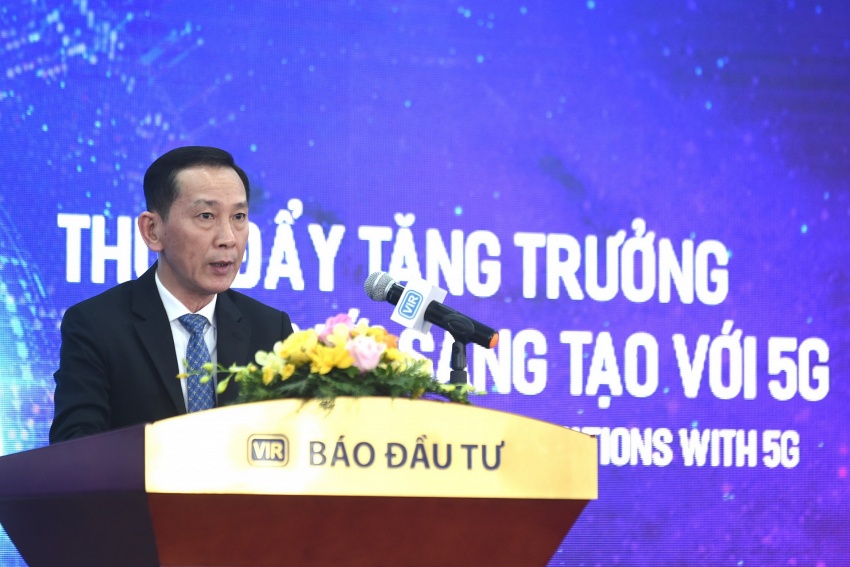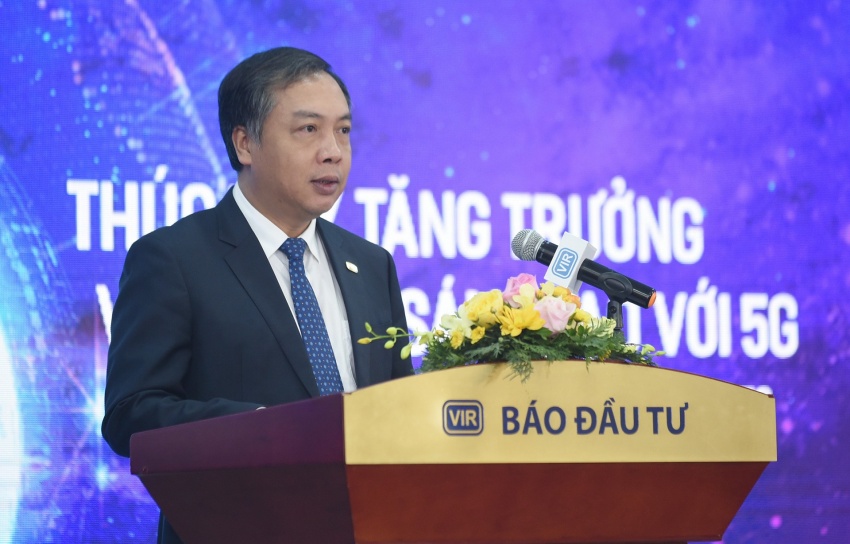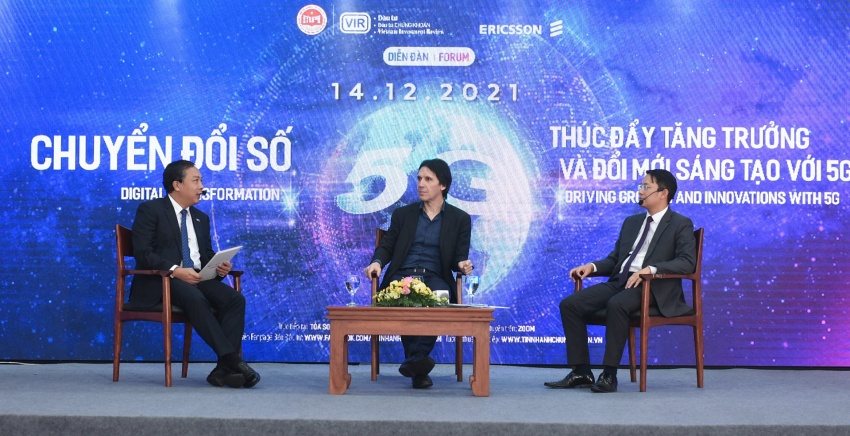Digital transformation: Driving growth and innovations with 5G
 |
| Deputy Minister of Planning and Investment Vo Thanh Thong delivering a speech at the forum |
According to Vo Thanh Thong, Deputy Minister of Planning and Investment, with Industry 4.0 having a substantial impact on all aspects of the economy and social life, more opportunities are coming along with challenges for each country, organisation, and individual.
“The Vietnamese Party and state have outlined orientations for building policies and programmes to actively join Industry 4.0 to accelerate the renovation of growth models and economic restructuring towards stronger and more sustainable development backed by sci-tech, innovation, and high-quality human resources,” Deputy Minister Thong said.
“5G is the backbone of the Fourth Industrial Revolution. The commercialisation of 5G mobile networks and universalisation of 5G mobile broadband network services are among the targets set in the National Strategy on the Fourth Industrial Revolution towards 2030,” he added.
Le Trong Minh, editor-in-chief of Vietnam Investment Review, said that the fourth industrial revolution opens up many opportunities as well as challenges. It has been an increasingly strong impact on all areas of the country's economic and social life.
 |
| Le Trong Minh, editor-in-chief of Vietnam Investment Review |
"Thanks to the global spread of the Fourth Industrial Revolution, data and digital technology are being vigorously used to change all aspects of life and business in Vietnam. The digital transformation process is identified as one of the essential pillars of economic growth, increasing labour productivity, creating new development space, and opening up great opportunities for Vietnam to achieve breakthrough development and quickly catch up with developed countries in its initial steps of the digital transformation process," Minh said.
“With favourable foundations both in terms of the legal corridor which is being gradually completed and the increasing awareness from businesses and people about the essentials of digital transformation, 5G has strong potential for development in Vietnam and to become a platform for innovation and growth in the coming years,” he added.
 |
The forum is participated by representatives from ministries and agencies, such as the MPI and the Ministry of Information and Communications, as well as policymakers, international organisations such as Enterprise Singapore, and representatives from foreign business associations in Vietnam like the European Chamber of Commerce in Vietnam, Singapore Business Association Vietnam, and domestic tech enterprises.
It is sharing practical experiences from representatives of state management agencies, policymakers, and experts from international associations and leading domestic and international technology enterprises on the trends of digital transformation, the role of 5G in economic growth and innovation, policies that pave the way for 5G commercialisation, as well as examples from other countries for successful digital transformation.
Worldwide, digital economies are growing rapidly. In Vietnam, the digital economy in 2021 is expected to reach a volume of $21 billion, up 31 per cent compared to 2020, equivalent to Malaysia and second only to Indonesia and Thailand.
The document of the 13th Party Congress has determined that by 2025, the digital economy should account for 20 per cent of GDP, and by 2030, for about 30 per cent of GDP.
According to experts, Vietnam possesses good conditions to build a digital economy. Besides this, the country is the destination of many leading IT and smart technology companies from around the globe, such as Apple, Samsung, Ericsson, ABB, and Qualcomm.
 |
| Denis Brunetti, president and head, Ericsson Vietnam, Myanmar, Cambodia, and Laos |
5G is transforming business worldwide. With commercial consumer-based 5G networks already live around the globe, the next wave of 5G expansion will allow businesses of all types to reap the benefits of enhanced mobility, flexibility, reliability, and security. The era of the 5G powered business is here – and with it an entirely new range of possibilities for service providers.
5G has the potential to accelerate the digital transformation of virtually any sector of industry or society. The next wave of socioeconomic development in Vietnam will come from innovation, science and technology, driven by the digital economy, through data. Data will become the new oil that fuels the engine of growth, which is the internet and the digital economy. And 5G in that world serves as the critical national infrastructure. The applications that will run on top of 5G will create major value for society, for consumers and for industries.
 |
| Christophe Poisson, Digital Sector Committee, EuroCham |
Our members are digital businesses and we have been proud to take part in Vietnam's digital transformation journey in many ways: providing digital transformation advisory services in the sectors of financial services, education, and smart city projects to name a few. Members of our committee have been following closely the development of Vietnam's digital transformation.
Obviously, 5G will contribute to a fundamental transformation of the digital. The world is undergoing a major shift towards the digital era, and Vietnam is part of this move. EuroCham digital sector committee members stand by with Vietnam's authorities to share our expertise and perspective as digital experts, entrepreneurs, and investors to implement the most optimal policies and technologies for Vietnam to thrive in the future.
 |
| Leon Cai, regional director, Enterprise Singapore |
Beyond helping small- and medium-sized enterprises (SMEs) within Singapore, we hope to share our experience with Vietnam. I am happy to share that Enterprise Singapore has been working closely with the Agency for Enterprise Development (AED) under the MPI on digital transformation collaboration.
Despite COVID-19, we co-organised a virtual roundtable in April to exchange ideas on digital transformation for SMEs. Subsequently, we organised a webinar together on digital transformation for manufacturers and the importance of sector-specific roadmaps on 24 June.
I hope to see more collaboration at both the G2G level, and also private sector solutions from both countries. Let’s make the best of this situation and encourage more SMEs to adopt digital solutions, capture new opportunities, and adapt to the new normal.
 |
| Vu Quoc Huy, director, Vietnam National Innovation Centre |
Digital transformation is not just the application of IT, it is about completely changing thinking, perception, and the way a business or a unit operates. Therefore, management agencies also need to change their perceptions to have more appropriate mechanisms and policies. Instead of just focusing on the use of technology and applications, they should aim to change processes, to find ways to apply technology effectively in the long term.
Businesses also need a long-term vision in implementing digital transformation. The MPI in collaboration with USAID is also implementing a project to advise and orient 100 businesses on effectively digitalise their operations. This is not only in digitising information but more importantly, in rebuilding processes to operate and manage the business based on the exploitation and analysis of the database.
 |
| Nguyen Phong Nha, deputy general director, Authority of Telecommunications, Ministry of Information and Communications (MIC) |
In 2021, despite the impact of the COVID-19 pandemic, global mobile network operators continue fostering the deployment of 5G networks to provide high-quality services and fulfil customers' needs. According to the Global Mobile Suppliers Association (GSA), currently, there are more than 180 operators in 72 countries/regions that have commercially utilised 5G networks.
With the aim of bringing Vietnam’s telecommunications in line with developed countries in terms of development and use of cutting-edge technologies, particularly broadband infrastructure such as the 5G network, the MIC has directed telecoms units and enterprises to take a variety of measures.
The MIC has set a target of officially licensing 5G commercialisation in 2022 and will soon cover high-tech industrial parks and demanding regions. This indicates the ministry's commitment to bringing Vietnam on equal footing with 5G-leading countries. In the upcoming period, the Department of Telecommunications will bulk up coordination with telecoms units and enterprises to quickly summarise and evaluate 5G network trials, while developing criteria for coverage and quality, as well as solutions on sharing infrastructure to reduce investment costs, increase usage efficiency, and master 5G technology through the use of Made in Vietnam equipment.
What the stars mean:
★ Poor ★ ★ Promising ★★★ Good ★★★★ Very good ★★★★★ Exceptional
Related Contents
Latest News
More News
- VNPAY and NAPAS deepen cooperation on digital payments (February 11, 2026 | 18:21)
- Vietnam financial markets on the rise amid tailwinds (February 11, 2026 | 11:41)
- New tax incentives to benefit startups and SMEs (February 09, 2026 | 17:27)
- VIFC launches aviation finance hub to tap regional market growth (February 06, 2026 | 13:27)
- Vietnam records solid FDI performance in January (February 05, 2026 | 17:11)
- Manufacturing growth remains solid in early 2026 (February 02, 2026 | 15:28)
- EU and Vietnam elevate relations to a comprehensive strategic partnership (January 29, 2026 | 15:22)
- Vietnam to lead trade growth in ASEAN (January 29, 2026 | 15:08)
- Japanese business outlook in Vietnam turns more optimistic (January 28, 2026 | 09:54)
- Foreign leaders extend congratulations to Party General Secretary To Lam (January 25, 2026 | 10:01)

 Tag:
Tag:


















 Mobile Version
Mobile Version